
Writers Chat
Writers Chat Recap For October Part 1
Writers Chat, hosted by Johnnie Alexander, Brandy Brow, and Melissa Stroh, is the show where we talk about all…
October 18, 2023
Writers Chat, hosted by Johnnie Alexander, Brandy Brow, and Melissa Stroh, is the show where we talk about all…
October 18, 2023
Why do you write? Do you have a theme, message, or goal for your books? I feel called, compelled,…
January 19, 2023
Why do you write? Do you have a theme, message, or goal for your books? I write to help…
August 19, 2021
Why do you write? Do you have a theme, message, or goal for your books? I write because I…
July 19, 2021
Why do you write? Do you have a theme, message, or goal for your books? I write because I…
June 19, 2021
Why do you write? I can’t imagine a life NOT writing. OR it’s those nasty voices in my head…
October 12, 2020